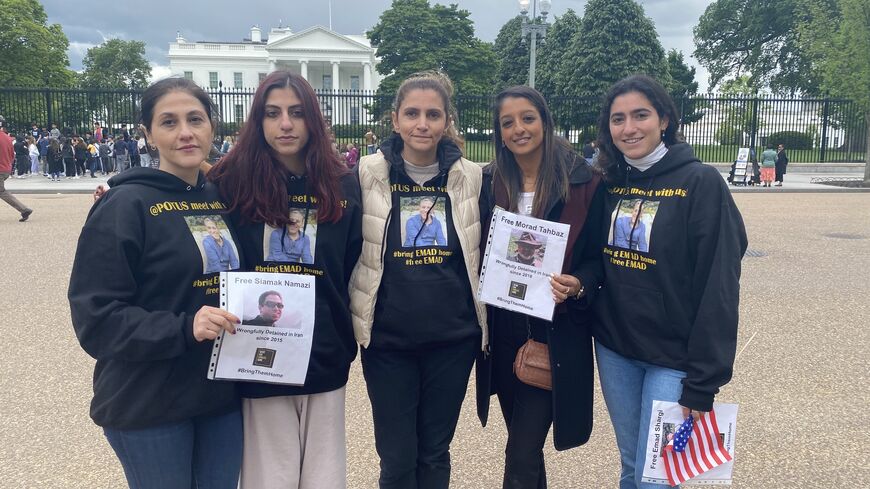WASHINGTON — The families of three US citizens held by Iran appealed to President Joe Biden on Wednesday to strike what could be a politically costly deal to bring their loved ones home.
More than two years after the US and Iran began indirect talks over a possible prisoner swap, Tehran is still holding three Iranian-Americans — Siamak Namazi, Emad Shargi and Morad Tahbaz — on charges US officials say are baseless.
“Our Americans in Iran have been ignored for too long, and they have been intertwined with policy when they never should have been,” said Neda Sharghi, whose brother Emad was first imprisoned in 2018.
Sharghi took part in a demonstration Wednesday in front of the White House attended by the relatives of roughly a dozen Americans wrongfully detained by foreign governments such as China, Syria and Venezuela.
“There are tools available, and it’s just having the political will to want to act on those,” said Tara Tahbaz, whose father, Morad, has been jailed since 2018 and whose mother, Vida Tahbaz, remains under a travel ban in Iran.
The Iranians say they are ready to strike a prisoner deal, reportedly in exchange for the release of billions of dollars in Iranian assets that are frozen abroad under US sanctions. By March, the two sides were close to finalizing the technical aspects of a Qatari and British-facilitated prisoner swap.
But Ali Vaez, the International Crisis Group’s Iran Project director, said the indirect talks were derailed for several weeks after tit-for-tat attacks between Iran-backed forces and US personnel in Syria killed an American contractor in late March.
Vaez said the Biden administration appears reluctant to move forward with what would be a politically costly deal for a president seeking re-election.
“I think the administration is dragging its feet because it's afraid of the political backlash,” he said. "The problem is that there's also a cost associated with leaving Americans behind."
Speaking on condition of anonymity, a State Department spokesperson declined to detail the diplomatic efforts underway to free the captive Americans but said the administration is “working tirelessly” to secure their release.
“As you can imagine, such discussions are sensitive and highly consequential for the US citizens who have been wrongfully detained,” the spokesperson said.
Their families’ pleas come as tensions between Iran and the United States remain high over Tehran’s rapidly accelerating nuclear program, its months-long violent crackdown on peaceful protesters and its supply of armed drones to Russia for use in Ukraine. Adding to the recent tensions was Iran’s seizure on Wednesday — its second in less than a week — of an oil tanker in Gulf waters, according to the US Navy.
For now, the families believe a face-to-face meeting with Biden — or at least a phone call — could help move their cases forward, especially after the relatives of American hostages in Syria and Russia secured Oval Office sit-downs with the president.
White House officials say Biden "can’t do everything” and point out that detained Americans are often freed without a presidential meeting.
But Babak Namazi, whose brother Siamak was the only American of six not returned home as part of a detainee swap in 2016, said his family is growing increasingly desperate. In January, Siamak Namazi resorted to a hunger strike to protest his seven-year detention and has taken several personal risks to raise awareness, including with a CNN interview conducted from Evin Prison in March.
“What will it take to finally get the president’s attention?” Babak Namazi asked.







